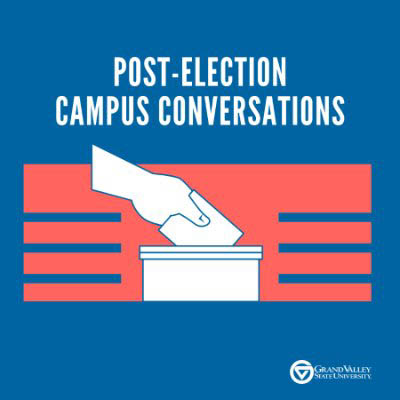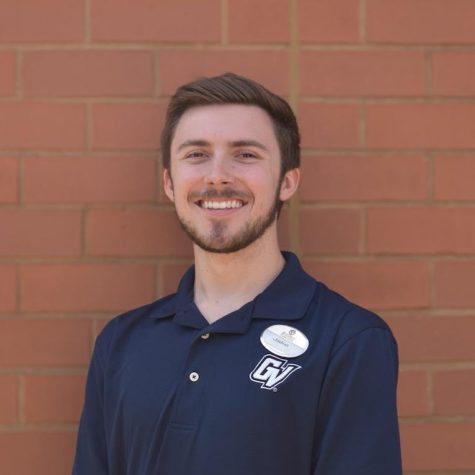Padnos/Sarosik Civil Discourse program to host post-election campus conversations

Courtesy to GVSU
Nov 2, 2020
Grand Valley State University’s Padnos/Sarosik Civil Discourse Program is holding several post-election Campus Conversation events, which will be focused on giving participants a space to talk about and process election results. These conversations will be held Nov. 4, 6 and 9, with one conversation each dedicated to GVSU staff, faculty or students, respectively.
Elections can be the climax for lots of new emotions, and during a year filled with much more stress and uncertainty than usual, professor Lisa Perhamus, Director of the Padnos/Sarosik Civil Discourse Program feels that there is a need for safe spaces that students can utilize to process the feelings that come with new election results.
“All the students I’ve been talking with are walking around on pins and needles with frayed, raw nerves,” Perhamus said. “There really needs to be some non-partisan space so no matter who you voted for, the conversation is for you as well.”
Perhamus is facilitating each conversation with professor Jeff Kelly Lowenstein, who teaches a course on journalism and civil discourse at GVSU. As facilitators, Kelly Lowenstein said that his and Perhamus’ duties are focused on creating an environment where everyone feels heard and welcomed.
“We’ll be working together to listen and to help process and synthesize ideas, themes, and connections that people are making,” Kelly Lowenstein said. “The goal is to be able to do that in a way people hopefully feel safe, respected, comfortable sharing whatever they have to say and edified by the time and space we provide for them.”
The decision to split up the Post-Election Campus Conversations into three groups was made for a couple of different reasons, one of which is to be mindful of group sizes as the conversations are being held on Zoom. Perhamus also said that each conversation being held for different groups should allow for more specific discussions to take place.
“Faculty may want to be processing how to handle classroom conversations, for example, whereas staff are going to be more concerned about work climate and interfacing with students,” Perhamus said. “Students are affected by both staff and faculty, and have a lot more concerns about just getting along on campus.”
The Post-Election Campus Conversations are also meant to be a space where students can talk about how the election has impacted their lives away from GVSU, where tensions at home may be running high as students approach holiday breaks.
“Students have been talking about the ways in which this political climate has created family tension and how hard it’s been to talk to their dad or their aunt,” Perhamus said. “The whole point, in a nutshell, is how to have a difficult conversation in a way that’s constructive.”
According to the Padnos/Sarosik Civil Discourse Program’s website, “civil discourse is not polite conversation, but, rather, intentional dialogue that builds understanding across difference.” Political conversations can be difficult and filled with disagreement, but they’re also prime opportunities to grow and to learn to be mindful of what others from any political mindset are feeling.
“I want to emphasize that this is a space that doesn’t lean left or right,” Perhamus said. “The Civil Discourse program is pretty unusual on campus in the sense that it’s not partisan at all.”
Regarding what kinds of topics might come up during each conversation, Melissa Baker-Boosamra, Associate Director of Student Life for Civic Engagement and Assessment, said that she expects discussions to feel similar to the ones after the 2016 presidential election.
“My guess is that we’ll find ourselves asking some of the same kinds of questions like, broadly, what happened, or looking at questions surrounding the popular vote, the electoral college, and potential challenges to the outcome that lots of people are concerned about,” Baker-Boosamra said. “We’ll also be looking at the impact of the results on our campus community.”
The Padnos/Sarosik Civil Discourse Program’s website shows that each conversation will last approximately one hour, and the times for either staff, faculty, or students are specifically chosen to meet the needs of each specific audience. The link to RSVP for each Zoom meeting can be found on their website.
























